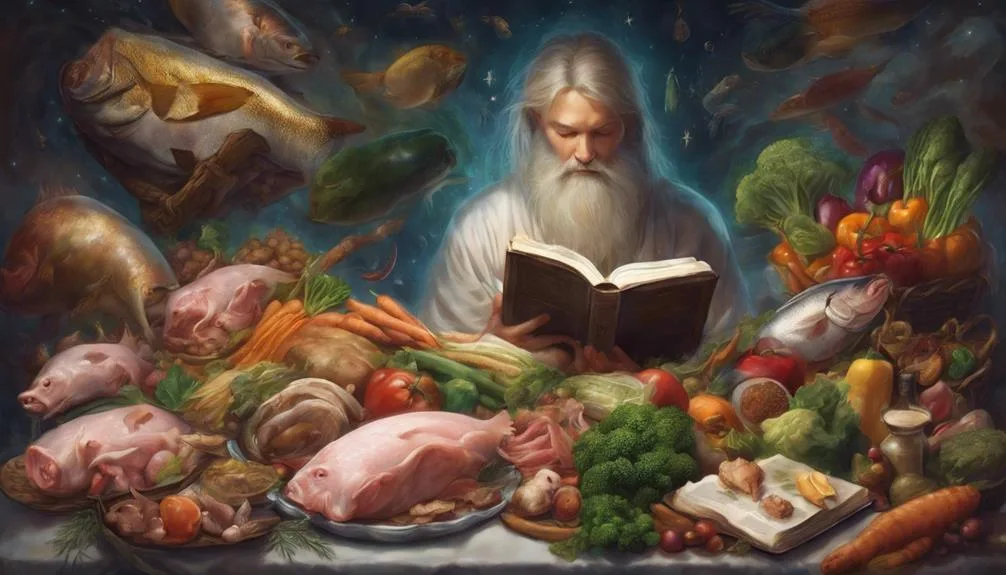Christians wondering about eating pork often find themselves in the midst of a complex topic. The rules from the Old Testament and the New Testament's views make it an interesting discussion.
By looking into the history and modern viewpoints, this topic not only challenges old beliefs but also brings to light new interpretations.
This introduction aims to explore these varying perspectives, making it easier to understand the ongoing conversation about dietary restrictions in Christianity.
Key Takeaways
- Understanding cultural, historical, and theological contexts is essential for interpreting dietary guidelines.
- Interpretations of dietary restrictions vary among scholars and theologians, with some viewing them as symbolic.
- Modern perspectives on dietary guidelines evolve with cultural influences and health considerations.
- Eating pork is a nuanced personal decision influenced by diverse biblical understandings and cultural significance.
Dietary Laws in the Old Testament
In the Old Testament, dietary laws were established as part of the religious practices followed by the Israelites. These laws had deep historical context and cultural significance within the Jewish community. The dietary restrictions weren't merely about what food to consume but were also a way to distinguish the Israelites from other nations and reinforce their identity as the chosen people of God.
The dietary laws carried significant religious symbolism and spiritual implications. For example, the prohibition against consuming certain animals like pork wasn't only a health measure in a time when food hygiene wasn't well understood but also symbolized purity and obedience to God's commands. By adhering to these dietary laws, the Israelites believed they were showing their faithfulness and commitment to God, demonstrating their willingness to abide by His instructions even in matters as mundane as food.
New Testament Views on Food
Exploring the dietary laws in the Old Testament provides a foundational understanding for interpreting New Testament views on food consumption among Christians.
In the New Testament, there are several key perspectives that shape Christian attitudes towards food:
- Cultural Influences: The New Testament reflects the cultural influences of the time, where certain foods held symbolic or ritualistic significance.
- Dietary Practices: The dietary practices of the early Christians were influenced both by Jewish traditions and the Roman environment in which they lived.
- Historical Context: Understanding the historical context is crucial for grasping the reasons behind certain dietary guidelines mentioned in the New Testament.
- Biblical Teachings: The teachings of Jesus and the apostles emphasized the importance of inner purity and righteousness over external rituals like dietary restrictions.
- Adaptation: As Christianity spread to different cultures, there was a gradual adaptation of food practices to accommodate diverse believers while upholding the core principles of the faith.
Interpretation of Dietary Restrictions

Understanding the rationale behind dietary restrictions in the New Testament requires delving into the cultural, historical, and theological contexts that shaped early Christian practices. Interpretation differences among scholars and theologians have led to varying views on whether dietary restrictions mentioned in the New Testament, such as abstaining from certain foods, are still applicable to Christians today.
Cultural influences, such as the Jewish background of early Christianity and the societal norms of the time, played a significant role in shaping these dietary guidelines. Some argue that these restrictions were specifically meant for the early Christian community to maintain a sense of identity and purity, while others believe that they were symbolic and no longer binding.
The interpretation of dietary restrictions is often influenced by theological perspectives and the understanding of the purpose behind these guidelines. By examining these factors, one can gain a deeper insight into how early Christians viewed food regulations and how these interpretations continue to shape modern Christian beliefs.
Modern Christian Perspectives
To understand how modern Christians perceive dietary restrictions, it's essential to consider the evolving interpretations of these guidelines within the context of contemporary religious practices and beliefs. In the present day, Christians navigate the question of consuming pork with a blend of cultural influences and health considerations shaping their perspectives.
- Cultural Influences:
- Modern globalization has led to increased exposure to diverse culinary practices, impacting how Christians view dietary rules.
- Some Christian denominations may place more emphasis on traditional cultural norms regarding food consumption.
- Health Considerations:
- Many Christians today prioritize health and wellness, leading them to consider the nutritional value of pork.
- Awareness of food-related health issues influences decisions regarding pork consumption.
- Some Christians may choose to abstain from pork for personal health reasons, such as allergies or dietary preferences.
Incorporating cultural influences and health considerations, modern Christians navigate the question of eating pork within the framework of their faith and lifestyle choices.
Conclusion: Can Christians Eat Pork?

Considering the cultural shifts and health trends influencing modern Christian perspectives, the question of whether Christians can eat pork remains a nuanced and personal decision for believers. As Christians navigate this topic, they often rely on both biblical interpretation and cultural practices to inform their dietary choices.
Biblical interpretation plays a crucial role in shaping Christians' views on consuming pork. While some point to passages in the Bible that suggest dietary restrictions, such as Leviticus 11, others emphasize the New Testament's teachings that all foods are clean (Mark 7:19). This diversity in biblical understanding leads to a spectrum of beliefs among Christians regarding the consumption of pork.
Furthermore, cultural practices significantly impact Christian attitudes towards eating pork. In some cultures, pork is a staple food and holds a deep cultural significance, while in others, it's avoided for various reasons. These cultural influences can weigh heavily on an individual's decision whether or not to include pork in their diet.
Ultimately, the question of whether Christians can eat pork is a complex one, influenced by biblical interpretation and cultural practices, making it a personal choice that varies among believers.
Conclusion
Christians have the liberty to consume pork, as New Testament teachings liberate followers from Old Testament dietary restrictions. While personal or cultural preferences may influence some to abstain, there's no scriptural ban on pork.
The decision on what to eat should thus reflect individual convictions, underlining the belief that God's acceptance transcends our dietary choices. This understanding invites us to ponder: How do our food choices reflect our faith and freedom?
Through this lens, we appreciate that our spiritual journey encompasses more than just our plates, emphasizing the expansive nature of divine love and grace.

